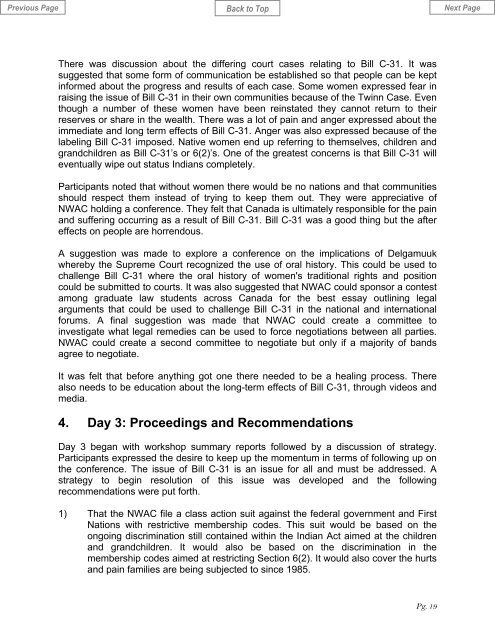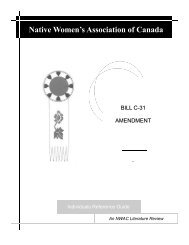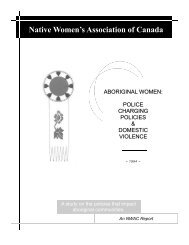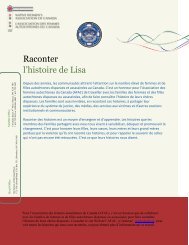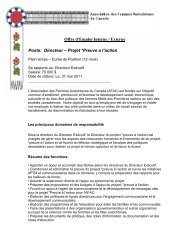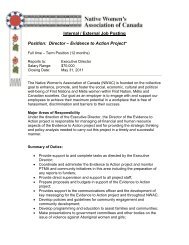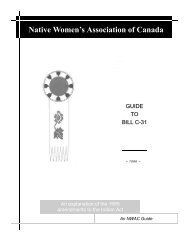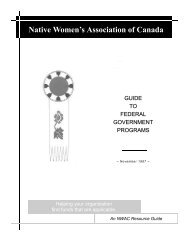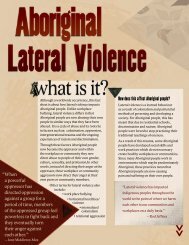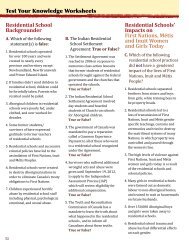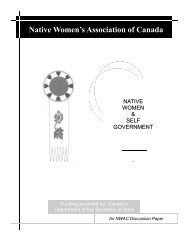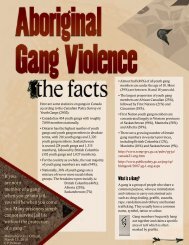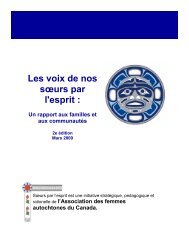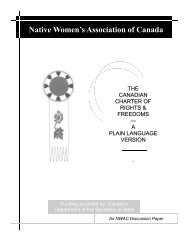BILL C-31 - Native Women's Association of Canada Website
BILL C-31 - Native Women's Association of Canada Website
BILL C-31 - Native Women's Association of Canada Website
- No tags were found...
You also want an ePaper? Increase the reach of your titles
YUMPU automatically turns print PDFs into web optimized ePapers that Google loves.
There was discussion about the differing court cases relating to Bill C-<strong>31</strong>. It wassuggested that some form <strong>of</strong> communication be established so that people can be keptinformed about the progress and results <strong>of</strong> each case. Some women expressed fear inraising the issue <strong>of</strong> Bill C-<strong>31</strong> in their own communities because <strong>of</strong> the Twinn Case. Eventhough a number <strong>of</strong> these women have been reinstated they cannot return to theirreserves or share in the wealth. There was a lot <strong>of</strong> pain and anger expressed about theimmediate and long term effects <strong>of</strong> Bill C-<strong>31</strong>. Anger was also expressed because <strong>of</strong> thelabeling Bill C-<strong>31</strong> imposed. <strong>Native</strong> women end up referring to themselves, children andgrandchildren as Bill C-<strong>31</strong>’s or 6(2)’s. One <strong>of</strong> the greatest concerns is that Bill C-<strong>31</strong> willeventually wipe out status Indians completely.Participants noted that without women there would be no nations and that communitiesshould respect them instead <strong>of</strong> trying to keep them out. They were appreciative <strong>of</strong>NWAC holding a conference. They felt that <strong>Canada</strong> is ultimately responsible for the painand suffering occurring as a result <strong>of</strong> Bill C-<strong>31</strong>. Bill C-<strong>31</strong> was a good thing but the aftereffects on people are horrendous.A suggestion was made to explore a conference on the implications <strong>of</strong> Delgamuukwhereby the Supreme Court recognized the use <strong>of</strong> oral history. This could be used tochallenge Bill C-<strong>31</strong> where the oral history <strong>of</strong> women's traditional rights and positioncould be submitted to courts. It was also suggested that NWAC could sponsor a contestamong graduate law students across <strong>Canada</strong> for the best essay outlining legalarguments that could be used to challenge Bill C-<strong>31</strong> in the national and internationalforums. A final suggestion was made that NWAC could create a committee toinvestigate what legal remedies can be used to force negotiations between all parties.NWAC could create a second committee to negotiate but only if a majority <strong>of</strong> bandsagree to negotiate.It was felt that before anything got one there needed to be a healing process. Therealso needs to be education about the long-term effects <strong>of</strong> Bill C-<strong>31</strong>, through videos andmedia.4. Day 3: Proceedings and RecommendationsDay 3 began with workshop summary reports followed by a discussion <strong>of</strong> strategy.Participants expressed the desire to keep up the momentum in terms <strong>of</strong> following up onthe conference. The issue <strong>of</strong> Bill C-<strong>31</strong> is an issue for all and must be addressed. Astrategy to begin resolution <strong>of</strong> this issue was developed and the followingrecommendations were put forth.1) That the NWAC file a class action suit against the federal government and FirstNations with restrictive membership codes. This suit would be based on theongoing discrimination still contained within the Indian Act aimed at the childrenand grandchildren. It would also be based on the discrimination in themembership codes aimed at restricting Section 6(2). It would also cover the hurtsand pain families are being subjected to since 1985.Pg. 19


